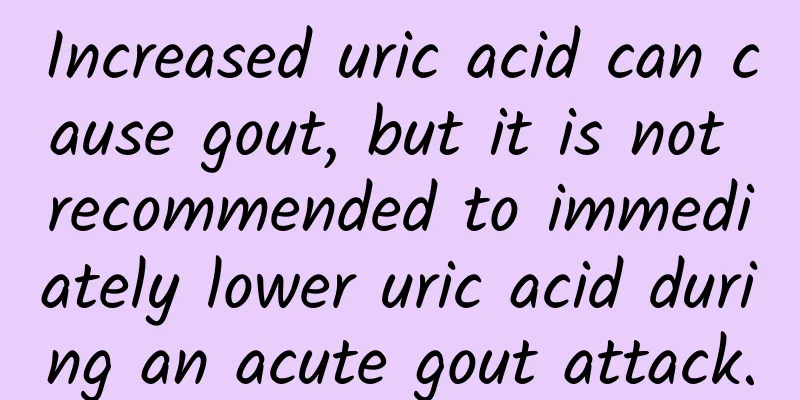Increased uric acid can cause gout, but it is not recommended to immediately lower uric acid during an acute gout attack.

|
A friend had an acute gout attack and asked Huazi what to do. Should he take medicine to lower uric acid? Huazi told him to relieve the pain first and not to rush to lower uric acid. Wait two weeks before deciding. The friend was a little confused. Isn't gout caused by high uric acid? Why can't uric acid be lowered? Huazi told his friends that although increased uric acid is the cause of gout, uric acid lowering treatment should not be used during an acute attack of gout, otherwise the symptoms may worsen. 1. Why do people suffer from gout? People who have experienced gout are terrified by the mention of it. Gout is caused by elevated uric acid levels in the blood, which are mainly caused by two reasons: one is purine metabolism disorder, which leads to excessive uric acid production; the other is reduced excretion of uric acid by the kidneys. When the blood uric acid level rises, urate crystals are easily precipitated in the joint cavity, soft tissue and other parts, forming tophi, which stimulate the adhesion and infiltration of white blood cells and phagocytize the urate crystals. Inflammatory factors will then be secreted, causing local inflammatory reactions such as redness, swelling, heat and pain. 2. It is not recommended to lower uric acid in the acute stage of gout Gout attacks are caused by excessively high levels of uric acid in the blood, but it is not recommended to use uric acid-lowering drugs for uric acid-lowering treatment during the acute phase. This is because the use of uric acid-lowering drugs will cause a significant drop in blood uric acid levels, increase the solubility of uric acid, promote the dissolution of the surface of tophi, and release a large number of inflammatory factors, which will aggravate the symptoms of inflammatory response and pain. Therefore, for the acute stage of gout, the purpose of treatment is to relieve pain, not to lower uric acid. There are two commonly used drugs for pain relief in the acute stage of gout, one is colchicine and the other is non-steroidal anti-inflammatory drugs. Colchicine can inhibit the chemotaxis, adhesion and phagocytosis of leukocytes, reduce the release of inflammatory factors by leukocytes, and relieve gout symptoms. It takes effect within 12 to 24 hours after oral administration and is the first choice for the acute stage of gout. However, colchicine has significant side effects, and the therapeutic dose is close to the toxic dose. Common gastrointestinal symptoms include vomiting and diarrhea, as well as muscle and peripheral neuropathy, bone marrow suppression and other adverse reactions. When gastrointestinal reactions occur, they are usually a sign of mild poisoning and require discontinuation of the drug. Now more recommended are non-steroidal anti-inflammatory drugs such as indomethacin, diclofenac, meloxicam, etc., which have good analgesic and anti-inflammatory effects. After oral administration, the onset of effect is usually within 24 hours, which is slightly slower than colchicine, but has fewer adverse reactions and better safety. They are now more commonly used. If colchicine and nonsteroidal anti-inflammatory drugs are not effective, or if they cannot be used due to contraindications, glucocorticoids can also be used for treatment. However, glucocorticoids have significant side effects, so it is recommended to use them in small doses for a short course of treatment, and the drug should be stopped as soon as the symptoms are relieved. 3. Uric acid-lowering treatment during the stable period Two weeks after the acute phase of gout, when the disease enters a stable phase, uric acid-lowering treatment can be performed. Commonly used uric acid-lowering drugs include allopurinol and febuxostat, which inhibit uric acid synthesis, and probenecid and benzbromarone, which promote uric acid excretion. However, when using uric acid-lowering drugs, a sudden drop in blood uric acid levels may also induce gout. Therefore, when using uric acid-lowering drugs, it is recommended to use them in combination with low-dose colchicine or non-steroidal anti-inflammatory drugs to prevent acute attacks of gout. While taking medication, you need to control your diet and avoid eating high-purine foods. However, 70% of uric acid is synthesized by the human body, and the reason for the increase in uric acid in most people is unknown. After the uric acid level drops to normal, it is likely to rise again if the medication is stopped. Therefore, most people need to maintain long-term uric acid-lowering treatment to avoid gout attacks. In summary, elevated uric acid is the cause of gout, but uric acid-lowering treatment is not recommended during an acute attack of gout, otherwise it may aggravate gout symptoms. Pain relief should be given first, and uric acid should be lowered after the condition stabilizes. The medicine must be used under the guidance of a doctor. If you have any questions about the use of the medicine, please consult a doctor or pharmacist in time. I am pharmacist Huazi. Welcome to follow me and share more health knowledge. |
<<: What are the cooking techniques for Mapo Tofu? Characteristics of Mapo Tofu
>>: Why is Mapo Tofu not tasty? Why is starch added to Mapo Tofu?
Recommend
What is the best medicine for uterine itching?
Women should be alert to their gynecological dise...
Are there any special snacks in Rizhao? When is the best time to go fishing in Rizhao?
Rizhao not only has rich and diverse specialties,...
Ofcom: UK news consumption report 2019
Ofcom has published its 'UK News Consumption ...
What is the secret of red dates breast enhancement
Red dates are really a very beneficial food. They...
Why do girls' knees turn red?
There are many types of examinations in the hospi...
Omdia: Global demand for display driver chips is expected to reach 7.98 billion units in 2023
According to Omdia's latest "Display Dri...
What planet is Earth? How many kilometers is the Earth's circumference?
The Earth is the only celestial body in the unive...
Early menstruation after moxibustion
After moxibustion treatment, if a woman has early...
What are the early reactions of pregnant women?
Many women react differently in early pregnancy. ...
What is the reason for the anus to bleed when going to the toilet?
When we have a bowel movement, we will pass throu...
How are those who always do manicures doing now?
Manicure has become an indispensable part of wome...
Lumbar spine "minor problem"
Many people have this problem: when they bend dow...
What are the symptoms of menopause?
We know that women's physiological characteri...
What are the symptoms of postpartum anxiety?
Many pregnant mothers will experience various kin...
I have breast swelling half a month before my period.
If a female friend experiences breast swelling be...









